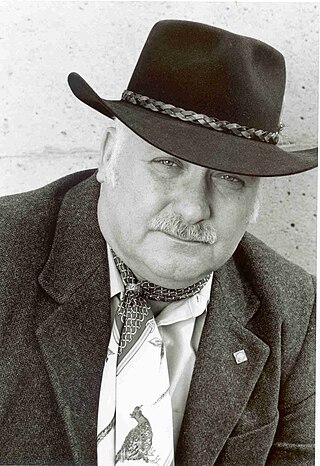Related Research Articles

Comparative psychology refers to the scientific study of the behavior and mental processes of non-human animals, especially as these relate to the phylogenetic history, adaptive significance, and development of behavior. Research in this area addresses many different issues, uses many different methods and explores the behavior of many different species from insects to primates.

LeapFrog Enterprises, Inc. is an educational entertainment and electronics company based in Emeryville, California. LeapFrog designs, develops, and markets technology-based learning products and related content for the education of children from infancy through grade school. The company was founded by Michael Wood and Robert Lally in 1994. John Barbour is the chief executive officer of LeapFrog.
Dog intelligence or dog cognition is the process in dogs of acquiring information and conceptual skills, and storing them in memory, retrieving, combining and comparing them, and using them in new situations.

Dog training is the application of behavior analysis which uses the environmental events of antecedents and consequences to modify the dog behavior, either for it to assist in specific activities or undertake particular tasks, or for it to participate effectively in contemporary domestic life. While training dogs for specific roles dates back to Roman times at least, the training of dogs to be compatible household pets developed with suburbanization in the 1950s.

Dan Isaac Slobin is a Professor Emeritus of psychology and linguistics at the University of California, Berkeley. Slobin has made major contributions to the study of children's language acquisition, and his work has demonstrated the importance of cross-linguistic comparison for the study of language acquisition and psycholinguistics in general.

César Felipe Millán Favela is a Mexican-American dog trainer. He is widely known for his Emmy-nominated television series Dog Whisperer with Cesar Millan, which was produced from 2004 to 2012 and is broadcast in more than 80 countries worldwide.

Stanley Coren is a psychology professor, neuropsychological researcher and writer on the intelligence, mental abilities and history of dogs. He works in research and instructs in psychology at the University of British Columbia in Vancouver, British Columbia. He writes for Psychology Today in the feature series Canine Corner.

Webkinz is a stuffed animal franchise by the Canadian toy company Ganz. The merchandise consists of stuffed animals that have online counterparts in the video games " Webkinz Classic" and " Webkinz Next". It was originally released by Ganz on April 15, 2005.
Temperament tests assess dogs for certain behaviors or suitability for dog sports or adoption from an animal shelter by observing the animal for unwanted or potentially dangerous behavioral traits, such as aggressiveness towards other dogs or humans, shyness, or extreme fear.
Me to You Bears is the brand name of a collection of teddy bears made by the Carte Blanche Greetings Ltd. They are often found in Clinton Cards. They were first created in 1987 and appeared in their current guise in 1995. A number of products are available related to Tatty Teddy including plush toys, figurines, cards, mugs, and wedding accessories.

Anthropomorphism is the attribution of human traits, emotions, or intentions to non-human entities. It is considered to be an innate tendency of human psychology.
Barbara Boardman Smuts is an American anthropologist and psychologist noted for her research into baboons, dolphins, and chimpanzees, and a Professor Emeritus at University of Michigan, Ann Arbor.

Talking animals are a common element in mythology and folk tales, children's literature, and modern comic books and animated cartoons. Fictional talking animals often are anthropomorphic, possessing human-like qualities. Whether they are realistic animals or fantastical ones, talking animals serve a wide range of uses in literature, from teaching morality to providing social commentary. Realistic talking animals are often found in fables, religious texts, indigenous texts, wilderness coming of age stories, naturalist fiction, animal autobiography, animal satire, and in works featuring pets and domesticated animals. Conversely, fantastical and more anthropomorphic animals are often found in the fairy tale, science fiction, toy story, and fantasy genres.

Marc Bekoff is an American biologist, ethologist, behavioural ecologist and writer. He was a professor of Ecology and Evolutionary Biology at the University of Colorado Boulder for 32 years. He cofounded the Jane Goodall Institute of Ethologists for the Ethical Treatment of Animals, and he is Professor Emeritus of Ecology and Evolutionary Biology at the University of Colorado Boulder.

Pound Puppies is an animated children's television series that first aired on the Hub Network on October 10, 2010, in the United States as the first Hub "original series". It also aired on YTV in Canada and on Boomerang in the UK, Ireland and Australia. Produced by Hasbro Studios, it was the second series to adapt Pound Puppies into a cartoon format. Originally a property by Tonka, Hasbro acquired Tonka itself and currently manages Pound Puppies. The plot style and music were similar to the 1960s TV series Hogan's Heroes and to films like Stalag 17 and The Great Escape. 9 Story Entertainment animated the first 7 episodes of the series. However, DHX Media/Vancouver took over production starting with episode 8.

Chaser was a Border Collie with the largest tested memory of any non-human animal. Chaser worked with Professor John W. Pilley, at his home in Spartanburg, South Carolina, from eight weeks old, until Pilley's death in June 2018. Pilley spent that time training her in a formal research project. Chaser could identify and retrieve 1,022 toys by name.

Human–canine bonding is the relationship between dogs and humans. This relationship can be traced back to at least 15,000 years ago, to the Bonn-Oberkassel dog, who was found buried alongside two humans. For centuries, dogs have been considered man's best friend. This is most evident in western countries, such as the United States, where over 48% of households have a pet dog.
Spontaneous Alternation Behavior (SAB) describes the tendency to alternate in their pursuit of different stimuli in consecutive trials despite a lack of training or reinforcement. The Behavior emerged from experiments using animals, mainly rodents, who naturally demonstrated the behavioral pattern when placed in previously unexplored maze shapes.

The Lives of Animals (1999) is a metafictional novella about animal rights by the South African novelist J. M. Coetzee, recipient of the 2003 Nobel Prize in Literature. The work is introduced by Amy Gutmann and followed by a collection of responses by Marjorie Garber, Peter Singer, Wendy Doniger and Barbara Smuts. It was published by Princeton University Press as part of its Human Values series.
Walter Wilczynski is an American ethologist, neuroscientist, and professor at Georgia State University (GSU) in Atlanta, Georgia.
References
- 1 2 "U-M professor explores dog genius". Mlive.com. 2007-12-22. Retrieved 28 Oct 2014.
- 1 2 "Dog Genius". 2007-12-23.
{{cite episode}}: Missing or empty|series=(help) - ↑ Eppele, Esther (2008-02-04). "See Prof. Barb Smuts on National Geographic's Dog Genius documentary this weekend". Department of Psychology. Archived from the original on 2011-05-19. Retrieved 2008-02-15.
- 1 2 3 Press News Service (2007-12-22). "U-M professor explores dog genius". Mlive.com. Retrieved 2008-02-15.
- ↑ Smuts, Barbara. "Holding hands (2)". University of Michigan. Retrieved 2008-02-15.
- ↑ Smuts, Barbara. "2 sets of 'hugs' - cat in center". University of Michigan. Retrieved 2008-02-15.